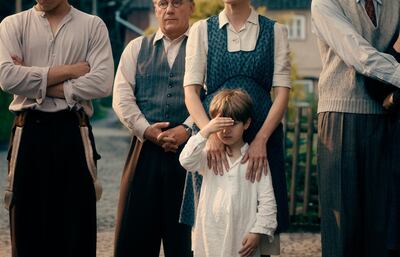If you've been even vaguely following the last year's movie releases, chances are you've at least heard of Roma. Alfonso Cuaron's stunning Mexican memory piece has swept the Oscars board with a huge 10 nominations, including the big two of Best Director and Best Picture, as well as Best Foreign Language Film.
That's a pack-leading number of nominations, foreign language or not, tied only with Yorgos Lanthimos' The Favourite. Lanthimos himself comes from a foreign language film background – his Greek-language black comedy Dogtooth was nominated in the foreign language category at 2010's awards, although this year's movie is very much an English-language piece, set in the British Royal court.
Roma historically ties with Ang Lee's 2000 Crouching Tiger, Hidden Dragon, with the most Oscar nominations ever for a foreign film.
Roma: The fifth ever film to be nominated in both Best Foreign Language and Best Picture
It's the only Best Foreign Language Film to also make the Best Picture list this year, and only the fifth ever, alongside Lee's 2000 movie, 1969's Z, 1998's Life is Beautiful, and 2012's Amour. It's hotly tipped to win Best Picture, and win or not, surely by the very merit of it being the sole foreign language nomination for Best Picture, it should win Best Foreign Language Film by default?
In the category, it is up against Lebanese director Nadine Labaki's Capernaum, Polish tale Cold War, German biopic Never Look Away, and Japanese drama Shoplifters. Labaki's film is Lebanon's second ever Best Foreign Language Film Oscar nomination, and received a 15-minute standing ovation at Cannes, as well as an endorsement from Oprah, but does it have a chance to win when up against a Best Picture nominee?
If historical precedent is anything to go by, Labaki's chances are very slim: of the four previous films, like Roma, to achieve nominations in both categories, all won the foreign prize, but none won the Best Picture statue. Cuaron's film could follow suit, but it is also the runaway favourite for the Best Picture prize, which none of his predecessors really were, certainly not to this extent. This makes it even more likely that it will win Best Foreign Language Film.
How does the category even work? Find out which films qualify in our guide here.
Will the judges sidestep logic, however? Other awards this year have done so
That puts us in an unusual position. With so much traction behind Roma's bid for Best Picture, could the judges feel it's only right to sidestep logic and spread the love a little more freely? That's certainly how both the New York and London Critics' Circle seemed to feel at their recent awards. Both picked Roma for Best Picture, but then in a logic-defying piece of apparent magnanimity, plumped for Cold War in the foreign language category.
Of the two biggest pre-Oscar indicator awards on the other hand, the BAFTAs played it straight, seemingly accepting the logic that since they gave Roma Best Film, it must by default be best in a foreign language too. The Golden Globes, on the other hand, doesn't allow foreign language films in its Best Picture category, so we really can't read too much into The Favourite's win there.
But even if Roma doesn't win, Labaki has two other truly strong competitors
Furthermore, Cuaron's competitors in the foreign language field include at least two competitors with serious form. Pawel Pawlikovski, who is nominated for his moody, post-war drama Cold War, already has one Foreign Language Film statue on his shelf for 2015's Ida – a feat Cuaron cannot match despite his 2014 Best Director win for the English-language Gravity.
Perhaps even more ominous is the German entry, Never Look Away, from Florian Henckel von Donnersmarck. Von Donnersmack has been here before in 2007. That year, a visual masterpiece from a Mexican director, Guillermo Del Toro's Pan's Labyrinth, had amassed an impressive six total Oscar nominations. It was considered a certainty for Best Foreign Language Film. Von Donnersmack's surprise-nominated debut. The Lives of Others, rode in and stole the Mexican's thunder.
Now, in 2019, a visual masterpiece from a Mexican director, Alfonso Cuaron's Roma, has amassed an impressive 10 total Oscar nominations. It is considered a certainty for Best Foreign Language Film. Von Donnersmack's surprise-nominated third film is also among the nominations. We'll complete that paragraph on February 25.
2019: a record breaking year for 'foreign' films
Stepping aside from Roma for a moment, foreign language movies have fared remarkably well in the "main" Oscars categories this year too. Pawlikowski joins Cuaron on the nomination list for Best Director, as well as Best Foreign Language Film, for his moody, Polish, post-war romance Cold War – the first time two directors of non-English films have made the Best Director list since Ingmar Bergman and Lina Wertmüller in 1976.
History was also made this year when, for the first time ever, three of the five nominations for cinematography went to non-English language films. Cuaron was nominated again for Roma, alongside Lukasz Zal for his work on Cold War and Caleb Deschanel for visualising the German Best Foreign Language nomination Never Look Away.
Elsewhere, Japanese animation Mirai will go toe-to-toe with Hollywood blockbusters like Incredibles 2 and Spiderman: Into the Spiderverse for Best Animated Feature. Ali Abbasi's quirky, Swedish language festival favourite Border may have missed out on Best Foreign Language Film, but it did land a nod for make-up and hair styling for its impressive prosthetics.
The diverse set of nominations this year could in part be due to the Academy’s efforts to grow the numbers of non-white, male Americans among its voting pool, or perhaps is just a sign that, while the US government may be looking increasingly inwards, the Academy is doing the opposite after a period where foreign cinema had lost currency in US cinemas.
It's not so long ago that the likes of Bergman and Fellini were regulars among Oscar nominees for writing and directing, while in 1976 alone, three non-English language performances were among the acting nominations - Marie-Christine Barrault for Cousin, Cousine, Liv Ullman for Face to Face and Giancarlo Giannini for Seven Beauties. Perhaps something of a reset is taking place?




